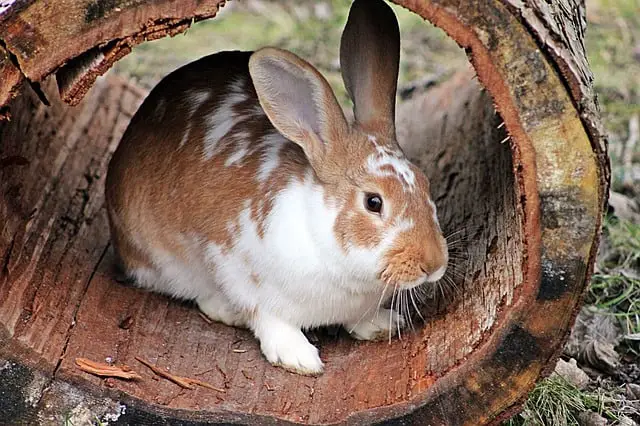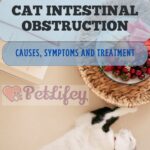
Rabbits are complex little creatures – there is a lot more to know than you can imagine. Like any animal, rabbits also have their frailties, and in this article we will examine one in particular, the ileum. This problem can afflict any rabbit, sending the efficient digestive system that distinguishes them into crisis.
Rabbit digestive system: how does it work?
Rabbits, therefore, are very complex animals and this is precisely what makes them unique. The rabbit’s digestive system is constantly functioning; just like us, once food is ingested, digestion begins, first in the stomach, then in the small intestine. Subsequently, fermentation takes place in the cecum.
All ingested fiber ferments in this section of the intestine, where nutrients are broken down. In order to get the nutrients it needs, the rabbit must produce, expel and eat the caecotroph, a particular excrement produced in the intestinal mucosa.
Once the nutrients have been assimilated, the droppings return to normal. Basically, the rabbit produces two types of faeces: the caecotrophs and the normal faeces.
What is the ileum?
When the system stops working and the small intestine does not properly process the ingested food (a phenomenon known as peristalsis), gastrointestinal stasis occurs, also called intestinal obstruction or ileus.
This condition causes gas to build up in the rabbit’s belly, causing severe pain and leading to fasting; the lack of appetite, in turn, causes dehydration and lethargy. All of this, if left untreated, can be fatal to the rabbit.
What does it cause?
There are four factors that can lead to this pathology: an improper diet, dental problems, pain or stress of any kind and a lack of physical exercise.
Inappropriate diet
Problems can arise if the rabbit eats too much food but not enough quality grass or hay. Hydration is also important: if the rabbit does not get enough fluids, the digestion process becomes complicated, making it more difficult for the ingested food to pass through.
Dental problems
A rabbit with too long teeth tends to chew badly and this causes indigestion, which is why you should have your rabbit’s teeth checked regularly by an experienced veterinarian.
Pain and stress
Severe tooth pain, infections or chronic pain (such as arthritis) can lead to intestinal blockage. Emotional stress, such as the loss of a friend or a move, can also be triggers.
Lack of exercise
If the rabbit is not active enough, intestinal motility can also be affected. So make sure you give them some time and let them play, so that he gets active and keeps itself lively.
What are the symptoms?
Typically, the symptoms of intestinal blockage are:
- Posture – When suffering from stomach pain, rabbits take a hunched position in an attempt to find relief.
- Lethargy – the rabbit will tend not to move and remain still for a long time.
- Anorexia – lack of thirst and appetite.
- Faecal problems – very dry stools can indicate dehydration and a blockage principle. There may also be a marked decrease or total disappearance of stool.
How to cure intestinal blockages?
If your rabbit has these complaints, you need to take them to the vet urgently. Your doctor will start therapy to get your digestive system back to normal. The treatments provided are:
- Hydration – if the rabbit has stopped drinking and is dehydrated, giving water is essential for its recovery.
- Medicines – treatments such as metoclopramide are called prokinetic drugs and can help the intestine to resume its normal function.
- Pain relievers – intestinal blockage is very painful for rabbits, and since the pain causes loss of appetite, relieving it can be instrumental in recovery.
- Probiotics – does not mean giving them yogurt, but giving them a compound that contains the enzymes necessary for the healing of the system. If the amount of good bacteria and bad bacteria is not balanced, problems with the intestinal system can occur.
Can intestinal obstruction be prevented?
Some rabbits are more prone to intestinal obstruction and, if this occurs, they need to be examined and treated by the vet as quickly as possible.
To prevent the problem it is advisable to have good habits, such as:
- Exercise – it is possible and recommended to have your rabbit do some movement; making them run free in their garden, for example, is a good way to keep them entertained and healthy. Some owners even take their rabbit for walks on a leash. To motivate them to move, you can also hide food in certain areas of the garden or house.
- Reduce stress – keeping your rabbit company, providing them with a lot of space to explore and feeding them correctly will certainly help to relax them, thus ensuring proper functioning of their organism.
- Proper nutrition – the intake of a lot of fiber and the right amount of water are fundamental requirements for gastrointestinal health.
- Regularly check their teeth – rabbits’ teeth grow all the time, which is why they are animals that need a correct diet to help them maintain their ideal length. There are also several chew toys on the market for this very purpose. When you take your rabbit to the vet for a checkup or some vaccinations, make sure the teeth are also checked. Rabbits tend to be impassive to pain, so it is important to know the character of your own: in this way you will be able to recognize any abnormal attitudes. It is important to remember this because, during visits, it is also easy for the animal to get agitated due to stress and fear.
Conclusions
Bowel obstruction can be fatal for rabbits, so pay close attention to their behavior to make sure they are always healthy. If your rabbit shows signs of discomfort, go to the vet as quickly as possible. The sooner you intervene, the better.






